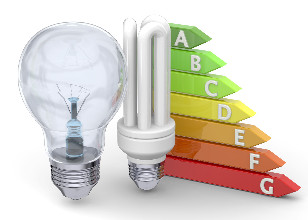Efficient energy use, sometimes referred to as the energy efficiency and energy saving, is to reduce the amount of energy required to provide products and services to you.
The energy efficiency and conservation can be defined as the energy consumption for this service, and it is usually related to the improvement of the relationship between them.
Energy efficiency also includes the improvement of the technical energy characteristics of the mechanism of the delivery of a variety of different types of energy, but it may also include better management and organization of energy production and consumption.
Energy is inextricably linked to the socio-economic development, and, therefore, it is difficult to imagine that this trend may be a means to achieve political objectives outside the energy sector. Some of the results can be achieved, or the result of a chain of actions, it is difficult to relate to this concept.

However, we can assume that the measures for the improvement of the energy efficiency and energy saving impact on the various sectors of the economy, which are common in a variety of areas at the same time, and have a direct impact in one area of the economy can be of influence on the other.
Traditionally, the focus in this area, the use of less energy for the same energy service. However, it may also increase the volume of services for the same amount of energy.
Thus, the energy efficiency can be achieved in the case of either a minor use of energy to provide the same level of service, or for the same energy used for a higher level of service. The measures for improving energy efficiency and energy saving, it can be focused on the following:
- the rational use of energy;
- the power saving mode.
The energy efficiency and conservation is an important aspect and is the focus of the activity, such as the reduction of losses in electricity production or an increase in the industrial activity. Important to the two countries.
An understanding of the wave impact which might occur as a result of the increase in the energy efficiency of the overall economy, it may be useful in the development of targeted policies.
Here are the different benefits of the efficient use of energy at the individual/sectoral/national/international typology. Several of the benefits of energy efficiency and energy saving: the increase in the it can bring much more benefits in a number of sectors.
A list of many of the wider benefits that can be derived from the use of the following measures:
The benefits in terms of energy efficiency and energy saving
For the health and well-being of the
Particularly strong evidence of positive impact of energy efficiency and energy saving in the residential sector of health care and related social consequences. A number of diseases, especially diseases of the respiratory system and asthma among children were closely associated with cold temperatures, damp and mould in the home.
Energy efficiency and energy saving in the construction industry, in particular, can bring a number of tangible benefits to the health of the residents of the houses of office workers and a host of other groups and the population as a whole. The effects on human health, it is also due to the inefficient housing and appliances.
The fight against poverty and social exclusion, and the availability of energy
In the context of high energy prices and the financial constraints of the poor often can not afford enough of a service for the maintenance of healthy living conditions, and enforced, it is not enough to heat a home to endure the poor quality of the air in the premises, and/or give up other necessities, such as food: occurrence, sometimes known as the "heat or food". However, this situation is usually described as "energy poverty." The energy efficiency and conservation can solve the problem through the adoption of measures at the household level to reduce energy costs through insulation and design, the supply of efficient equipment for space heating and water heating, and lighting, as well as training in the field of energy efficiency among the population.
Access to energy services is essential for the release of people out of poverty through the provision of raw materials for the socio-economic development. Measures to improve the energy efficiency of the carried out by the suppliers of the energy to be able to free up additional resources in order to reduce the technical losses in the systems of production and distribution of energy.
The industrial productivity and of the competitiveness of the
There are a number of improvements in industrial productivity, which could provide an energy-saving production and saving of energy. These include the increased profit, safer working conditions, consistency and improvement in the quality of the production and lower the capital and operating costs, and reduce waste and energy consumption. These benefits can be received by these industries on a global level through increasing competitiveness, and it can be extended to the ordinary working conditions, the safety and satisfaction of the individual employee.
The benefits for the energy suppliers and the infrastructure of the

At first glance, it may seem that there is an energy efficiency and conservation is in conflict with the commercial interests of the providers of energy services. However, the research suggests, however, that the energy providers will receive a number of benefits in terms of providing better energy services to customers, reduce operational costs, and increase profits.
Up to 10% of the benefit resulting from the measures for the increase are likely to be generated directly to the energy providers, which explains why a lot of of the devices that they are already taking bold steps to cope with the demand, urged in a number of countries, the regulatory obligation in this regard.
The increase in the value of the property,
There is some evidence that investors are willing to pay for the rent and the premium, to sell the real estate to the highest energy efficiency.
For example, energy is one of the highest operating cost in most offices, so that the net present value of the future savings in energy consumption, it can be added to the sales tax. The study shows that the market is increasingly reflecting these arguments.
The existing analysis of the data shows that green buildings have increased resale value and rental rates, and also offer a wider range of benefits even beyond the value of the property, which may have a higher rate of employment, increased comfort, lower maintenance costs and a lower degree of capitalisation and increased productivity.
Jobs
Investments in energy efficiency programs and energy efficiency have a large potential for the creation of new jobs with a short lead-time. The net improvement in employment can be explained by the improvement of the programmes of direct job creation and indirectly through consumer surplus spending, in addition to the other benefits of the state's budget, such as the reduction of unemployment benefits. The direct jobs created during the implementation of the measures for the improvement of the energy efficiency and conservation are the easiest to measure, and it is likely that it will be a great deal. Indirect jobs can also be created in the production of raw materials, however, these jobs can be maintained only for a particular application.
The reduction of public expenditure in the field of energy, the future of the public sector as a separate economic unit. The energy efficiency and conservation will contribute to the reduction of the burden on the national budget and improve the fiscal balance.
The energy security of the
Energy efficiency has an important role to play in reducing dependence of the country on imports to meet their needs, and thus contribute to the creation of a variety of energy balance. The implications, which emerge in relation to the energy security, they are structurally dependent on the energy sector in the country.
The macro-economic effects of the
The energy efficiency and conservation can lead to significant positive macroeconomic impacts such as GDP growth, the trade balance, the restructuring of the economy, employment, and national competitiveness. You can also have a significant impact on the state budget. The investment in this area, which include the transfer of capital from energy to less energy-intensive activities.
This may have important implications for the economics and management of energy, in General, if the translation involves a restructuring of the economy on a more labour-intensive activities.
To reduce the emission of greenhouse gases
The energy efficiency and conservation to reduce the consumption of fossil fuels and to reduce greenhouse gas emissions. Indeed, the measures are expected to contribute to a 44% reduction in carbon emissions by the year 2035, it will have the opportunity to achieve the international targets on climate change.
In comparison with the other measures for the reduction of greenhouse gas emissions, increase energy efficiency, as a rule of thumb, the more cost-effective and can be implemented at a faster pace. The reduction in emissions has already been recognized as one of the most significant results of the measures to increase energy efficiency, and they often have already been tested, as, of course, in the evaluation of existing programs.
The decline in the price of energy

The decline in energy prices depend on a number of factors, such as the rate of energy supply, energy use, and market conditions. Ceteris paribus, if the demand for it will decrease the cost of energy should be reached, and it is expected that the energy efficiency and conservation it will be necessary to reduce the demand for energy.
The management of the natural resources of the
The other advantage of a reduction in the demand for energy is easing the pressure on natural resources.
In view of the fact that, by 2035, global production of conventional oil will be reduced, energy efficiency and conservation will become an increasingly important measure to relieve the pressure on the limited resources. The goal of the development of the sustainable development is an international responsibility, and access to, modern energy services is essential to ensure that the basic necessities of life, as well as the terms and conditions of the socio-economic development.


























